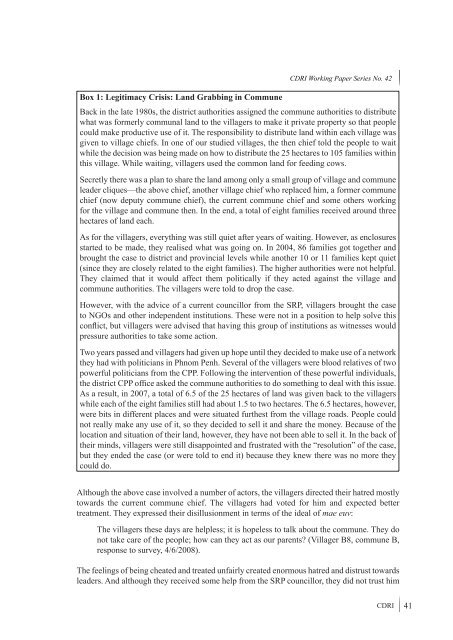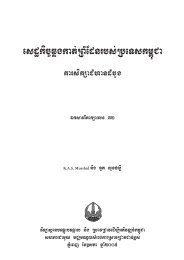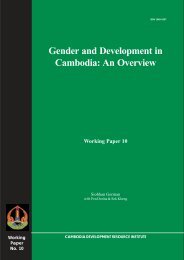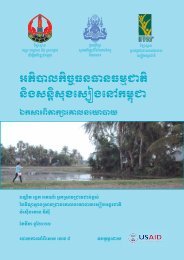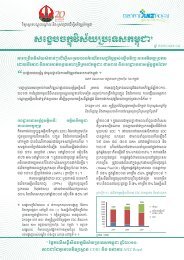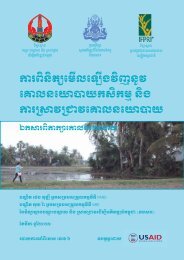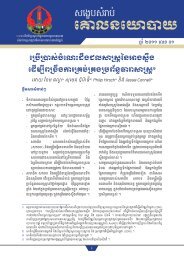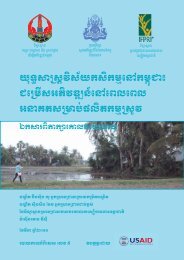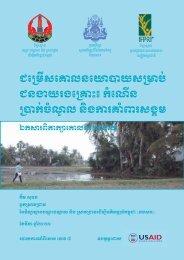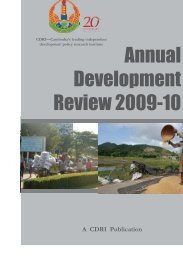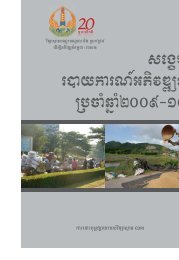Leadership in Local Politics of Cambodia: A Study of ... - CDRI
Leadership in Local Politics of Cambodia: A Study of ... - CDRI
Leadership in Local Politics of Cambodia: A Study of ... - CDRI
You also want an ePaper? Increase the reach of your titles
YUMPU automatically turns print PDFs into web optimized ePapers that Google loves.
��������������������������������<br />
Box 1: Legitimacy Crisis: Land Grabb<strong>in</strong>g <strong>in</strong> Commune<br />
Back <strong>in</strong> the late 1980s, the district authorities assigned the commune authorities to distribute<br />
what was formerly communal land to the villagers to make it private property so that people<br />
could make productive use <strong>of</strong> it. The responsibility to distribute land with<strong>in</strong> each village was<br />
given to village chiefs. In one <strong>of</strong> our studied villages, the then chief told the people to wait<br />
while the decision was be<strong>in</strong>g made on how to distribute the 25 hectares to 105 families with<strong>in</strong><br />
this village. While wait<strong>in</strong>g, villagers used the common land for feed<strong>in</strong>g cows.<br />
Secretly there was a plan to share the land among only a small group <strong>of</strong> village and commune<br />
leader cliques—the above chief, another village chief who replaced him, a former commune<br />
chief (now deputy commune chief), the current commune chief and some others work<strong>in</strong>g<br />
for the village and commune then. In the end, a total <strong>of</strong> eight families received around three<br />
hectares <strong>of</strong> land each.<br />
As for the villagers, everyth<strong>in</strong>g was still quiet after years <strong>of</strong> wait<strong>in</strong>g. However, as enclosures<br />
started to be made, they realised what was go<strong>in</strong>g on. In 2004, 86 families got together and<br />
brought the case to district and prov<strong>in</strong>cial levels while another 10 or 11 families kept quiet<br />
(s<strong>in</strong>ce they are closely related to the eight families). The higher authorities were not helpful.<br />
They claimed that it would affect them politically if they acted aga<strong>in</strong>st the village and<br />
commune authorities. The villagers were told to drop the case.<br />
However, with the advice <strong>of</strong> a current councillor from the SRP, villagers brought the case<br />
to NGOs and other <strong>in</strong>dependent <strong>in</strong>stitutions. These were not <strong>in</strong> a position to help solve this<br />
����������������������������������������������������������������������������������������������<br />
pressure authorities to take some action.<br />
Two years passed and villagers had given up hope until they decided to make use <strong>of</strong> a network<br />
they had with politicians <strong>in</strong> Phnom Penh. Several <strong>of</strong> the villagers were blood relatives <strong>of</strong> two<br />
powerful politicians from the CPP. Follow<strong>in</strong>g the <strong>in</strong>tervention <strong>of</strong> these powerful <strong>in</strong>dividuals,<br />
����������������������������������������������������������������������������������������������<br />
As a result, <strong>in</strong> 2007, a total <strong>of</strong> 6.5 <strong>of</strong> the 25 hectares <strong>of</strong> land was given back to the villagers<br />
while each <strong>of</strong> the eight families still had about 1.5 to two hectares. The 6.5 hectares, however,<br />
were bits <strong>in</strong> different places and were situated furthest from the village roads. People could<br />
not really make any use <strong>of</strong> it, so they decided to sell it and share the money. Because <strong>of</strong> the<br />
location and situation <strong>of</strong> their land, however, they have not been able to sell it. In the back <strong>of</strong><br />
their m<strong>in</strong>ds, villagers were still disappo<strong>in</strong>ted and frustrated with the “resolution” <strong>of</strong> the case,<br />
but they ended the case (or were told to end it) because they knew there was no more they<br />
could do.<br />
Although the above case <strong>in</strong>volved a number <strong>of</strong> actors, the villagers directed their hatred mostly<br />
towards the current commune chief. The villagers had voted for him and expected better<br />
treatment. They expressed their disillusionment <strong>in</strong> terms <strong>of</strong> the ideal <strong>of</strong> �������:<br />
The villagers these days are helpless; it is hopeless to talk about the commune. They do<br />
not take care <strong>of</strong> the people; how can they act as our parents? (Villager B8, commune B,<br />
response to survey, 4/6/2008).<br />
The feel<strong>in</strong>gs <strong>of</strong> be<strong>in</strong>g cheated and treated unfairly created enormous hatred and distrust towards<br />
leaders. And although they received some help from the SRP councillor, they did not trust him<br />
<strong>CDRI</strong><br />
41


